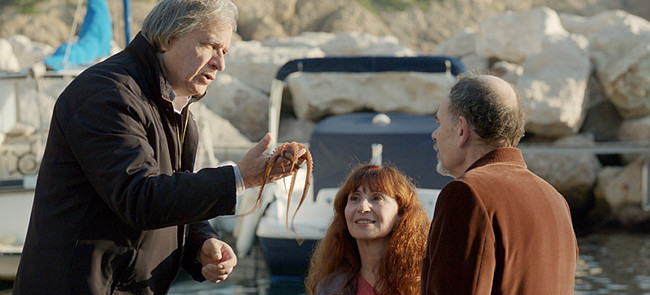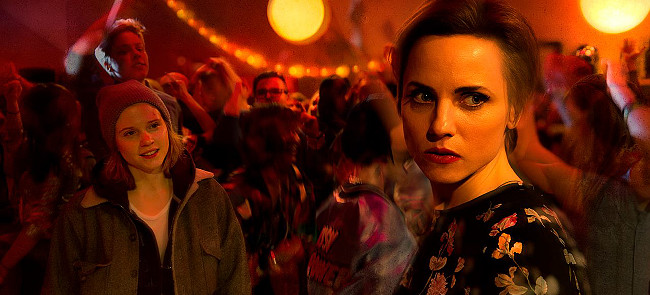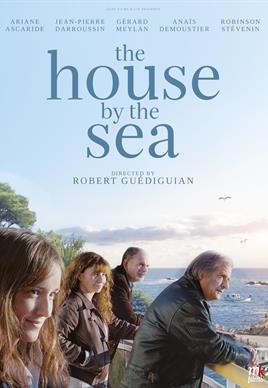| SHADOWS ON THE WALL | REVIEWS | NEWS | FESTIVAL | AWARDS | Q&A | ABOUT | TALKBACK | |||||||||||||||||||||
 Shadows off the beaten path Shadows off the beaten pathIndies, foreigns, docs, revivals and shorts...
On this page:
HE LOVES ME |
THE HOUSE BY THE SEA |
NINA
| |||||||||||||||||||||
| See also: SHADOWS FILM FESTIVAL | Last update 30.Jan.19 | |||||||||||||||||||||
|
He Loves Me Review by Rich Cline | 
| |||||||||||||||||||||
 dir-scr Konstantinos Menelaou prd Konstantinos Menelaou, James Pearcey, Russell Would with Hermes Pittakos, Sanuye Shoteka narr Thanos Lekkas release Gr Apr.18 off, UK 15.Feb.19 18/Greece 1h14 |
 Gorgeously shot in isolated, natural locations, this poetic film depicts a couple as if they are the last two people on earth, spending time alone in an attempt to save their relationship. This is a resolutely arthouse movie, with a lot of footage of two men alone on a beach, trying to find a way to make their connection work. It's thoughtful and evocative. Two young men decide to escape the noise of the city for the calm of a beautiful beach on the island of Crete. One of them is afraid the other wants to break up, but is doing his best to make it work. Camping on the beach, climbing on rocks, lounging in the sunshine, watching the sunset: they seem very close physically and emotionally, even as issues churn under the surface between them. So they also watch each other from various distances and try to confront about the issues that are straining their relationship. Narrated in first-person (by Lekkas), the film has no dialog. The voiceover is an essay exploring one man's thoughts, describing how the couple met and began their relationship, their initial attraction and the intensity of their early romance. They then encounter the difference between wanting each other and respecting each other, and how loving each other made it difficult to be as easy with each other as they were at the start. The voice also speaks about how their fights were followed by increased intimacy. A real-life couple, Pittakos and Shoteka don't hesitate to strip off for some naked swimming in crystal clear water, as well as plenty of physical intimacy. They intriguingly play it all very coolly, never trying to visually enact the drama that's being described in the narration. Their problems apparently stem from a drug-fuelled night when they made an awkward attempt to open their relationship. There's certainly little evidence of the arguments that are described, including the anger, shouting and emotional pain. As it goes along, the film's collage-style approach works on both levels: the visual beauty of these men in this place and the verbal thoughts pondering the nature of a relationship. As the voiceover reflects the thoughts of one of these men, it's also clear that these feelings are universal, expressing the nagging insecurities people experience in any relationship, worrying even though there's no reason to do so. All of this introspection makes the film feel rather mopey, of course. But it's packed with little insights and some properly stunning imagery.
| ||||||||||||||||||||
|
The House by the Sea La Villa Review by Rich Cline | 
 TORONTO FILM FEST
|  Set in a picturesque notch in France's southern coastline, this ensemble drama circles around an estranged family brought back together by circumstances and forced to deal with both past and very present issues. It's low-key and meandering, but thankfully filmmaker Robert Guediguian avoids melodrama, allowing space for actors to create realistically messy characters who are easy to identify with. When Maurice (Ulysse) has a stroke, his three middle-aged children interrupt their lives to make a plan. Actress Angele (Ascaride) returns to the picturesque seaside village she left 20 years earlier for good reason. The cynical Joseph (Darrousin) returns with his much younger fiancee Berangere (Demoustier). While older Armand (Meylan) has remained in town managing the family restaurant. Their reunion is both warm and prickly. Meanwhile, Maurice's doctor Yvan (Tregouet) is the son of neighbours (Boudet and Mnich) who are having their own problems. And young fisherman Benjamin (Stevenin) has a crush on Angele. The film's gentle, loping pace allows Guediguian to hone in on details in the characters and relationships. Conversational rhythms are natural, echoed in the trains that cross the stone viaduct above the cove. Old connections add complications, such as the way Yvan latches on to Berangere, who was already planning to leave Joseph. Armand is determined to maintain his father's cheap and cheerful recipes in the restaurant. And then a topical angle arrives with the discovery of refugee children from North Africa. Ascaride anchors the film as a woman for whom everything in this place reminds her of a past she wants to forget, notably the loss of a younger sister (Seignon in flashbacks). And Angele's presence causes ripples for those who have remained in town. Ascaride has superb chemistry with Darroussin and Meylan, a lifelong bond that shows the strain of decades of neglect. It's wonderful to see them reconnect and remember their childish encounters. Even better is the way they rediscover themselves. Yes, all of this is very French, with wordy, metaphor-heavy dialog and pointed confrontations that deliberately sidestep the true issues until everything erupts into rather dry emotions. As it goes along, the film folds in a variety of storylines, playing cleverly with the relationships and culture. These are people who want to maintain the positive elements of a life they've always known. But the world is changing around them, and their constant refrain that "it was better back then" is annoying the younger generation.
|
| Nina Review by Rich Cline | 
|  dir Olga Chajdas prd Andrzej Polec scr Olga Chajdas, Marta Konarzewska with Julia Kijowska, Eliza Rycembel, Andrzej Konopka, Katarzyna Gniewkowska, Maria Peszek, Tana Pauhofova, Irena Melcer, Ana Nowicka, Edward Kalisz, Ryszard Jablonski, Magdalena Czerwinska, Alicja Juszkiewicz release US Jun.18 fff, Pol 17.Sep.18, UK 25.Jan.19 18/Poland 2h09
|  Subtle and slick, this Polish drama is shot in a way that keeps the audience on the outside, unsure about the connections between the characters. This makes it intriguing, especially since it's finely shot and acted. And it is grappling with some big, resonant themes. But it's also irritatingly elusive thanks to an undercooked script and slack editing. A schoolteacher in her 30s, Nina (Kijowska) and her husband Wojtek (Konopka) are searching for a surrogate to have their child and hopefully save their marriage. Wojtek thinks they've meet one in Magda (Rycembel), a free-spirited airport security officer whose car was hit by Nina and repaired by Wojtek. She even has green eyes. Without telling her what they're up to, the couple sets out to seduce her. But Magda has her own awkward relationship with a girlfriend (Pauhofova) she's not particularly faithful to. And Nina begins to think she's falling in love with Magda. Filmmaker Chajdas assembles this in an oblique way, drifting down sideroads into off-topic sequences that only obliquely fit into the central narrative. And the plot itself feels oddly constructed, with some badly contrived points: events happen conveniently, arguments pop up without reason and many scenes feel unfinished. But the bigger problem is that the relationships don't ring true. It's fairly clear from the start that Nina and Wojtek's marriage can't be saved, and that Nina is merely infatuated with Magda. Kijowska brings a strong sense of haunted yearning to her role as a woman who has always done what was expected of her and now begins to wonder what she really wants. She's too mopey and self-involved to be fully sympathetic, but she feels real. Rycembel's Magda is much more interesting, prickly and unpredictable, opinionated and loosely edgy. It's easy to see why Nina would be attracted to her, but Magda's response can only be physical, no matter how hard the script pushes the romance. As a filmmaker, Chajdas clearly has a lot on her mind, filling the screen with scenes that must mean a lot for her (including several classroom discussions of Godard's Le Mepris). The story idea is strong but, without a more aggressive editor, the various elements only vaguely connect with the audience. Ideas and issues hold the attention, including the depiction of a marriage neither partner can be bothered to save. But as a lesbian coming-of-age or a romance between two women, the film never comes to life.
| 
See also: SHADOWS FILM FESTIVAL © 2019 by Rich Cline, Shadows
on the Wall
HOME | REVIEWS | NEWS | FESTIVAL | AWARDS
| Q&A | ABOUT | TALKBACK | | ||||||||||||||



